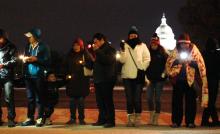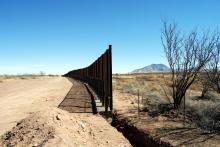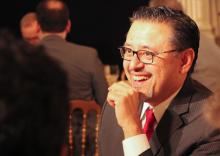Immigration


We are only two months into 2015 and it has already proven to be a busy year. There is much to be hopeful for in this coming year and much work still to be done on changing the hearts and minds of those in positions of leadership. We are so thankful for our community of supporters who invest and encourage our mission and ministry!

“Sean Penn’s ‘Green Card’ comment may have ruined the entire Oscars.”
That was the headline from the Huffington Post. I didn’t watch the Oscars, but I’m always curious about pop-culture scandals. What could Sean Penn have said that was so egregious that it threatened to ruin “the entire Oscars?”
Penn delivered the award for Best Picture, which went to Birdman. After Penn opened the card, he took an awkward moment to gather his thoughts about how he would introduce the winner, whose director happened to be his long-time friend Alejandro Iñárritu.
That’s when Penn delivered the scandalous introduction, “And the Oscar goes to … Who gave this son of a bitch his green card? Birdman.”

On Monday night, a Texas court temporarily halted the implementation of Obama’s Executive Action announced last November. Specifically, the ruling delays the application of the extended Deferred Action for Child Arrivals (DACA) — previously slated to begin on Feb. 18 — and Deferred Action for Parental Accountability (DAPA) programs until the ruling is superseded by a higher court.
This ploy began in December, when a combination of governors and attorney generals from 26 Republican-run states sued the federal government to block the Department of Homeland Security directives from going in to effect. This lawsuit, Texas v. United States of America, challenges the legality of both the DACA and DAPA initiatives, which together would have granted nearly 5 million immigrants eligibility for temporary deferred action and work permits.
Here’s what you need to know about the Texas vs. United States ruling in the aftermath of Monday night’s decision.

In November, President Obama issued an executive action that would protect nearly five million undocumented immigrants in the United States. Yet, since Congress returned in January, many questions linger regarding the implementation of executive action and the status of comprehensive immigration reform.
Last week, the Senate Committee on Homeland Security and Governmental Affairs hosted a hearing regarding “Deferred Action on Immigration: Implications and Unanswered Questions.” The purpose of the hearing according to Chairman Sen. Ron Johnson (R-Wis.) was to “obtain a more complete understanding of the logistical, financial, and national security implications of these [executive action] policies.” Yet, many questions still remain.
Among other things, Obama’s November action expanded the 2012 Deferred Action for Childhood Arrivals program and provided legal reprieve to the undocumented parents of U.S. citizens and permanent residents who have resided in the country for at least five years. It protects a small number of the 11 million aspiring Americans who are living and working in the United States without documentation. At it is root, Obama’s executive action considers the people, not the politics that create division.
The GOP majority in Congress is attempting to oppose executive action by threatening to defund the Department of Homeland Security.

In my classroom, there is a little boy from Honduras. He speaks Spanish — that is the language of his heart — but he is learning English and tries with all his heart to learn new words and strange phrases that will allow him to live in his new world here. He is 9 years old, with dark hair cut straight across his forehead in a wonderfully crooked line. He has deep brown eyes the color of a plowed field, eyes that sparkle like starlight at night off a pool of calm water. He has big dimples that catch teardrops when he laughs until he cries, or when he cries until the sadness in his heart resides. He has a broad smile that is sometimes mischievous but most times full of joy.
Sometimes I wonder ... what is he thinking as he closes his eyes at the end of the day, or opens them at dawn?
"I hope my new world will embrace me," he thinks tenderly, "and not call me an illegal alien ... and not try to tear me apart from my Aunt ... and not try to tear me apart ... and not place me in the shadows ... and not make me a shadow.
Mami, can you hear me in the dawn? Will my words reach you over the land, over the land, to the valley, between the mountains, to La Esperanza, to Honduras? Help me, Mami. Please. I don't want to be a shadow here. ...

I loved Paddington, the new movie based on the Michael Bonds books about an immigrant bear who arrives in London from darkest Peru. Paddington has no resources other than his faith that he will be welcomed with open arms. Sadly, his experience begins like that of most undocumented immigrants to the European or American shores – he is rejected and ignored. But this is a playful movie with a happy ending that celebrates what wonderful things happen to the Brown family when they allow Paddington into their hearts and home.
Admittedly, Paddington is a handful – a wild animal unfamiliar with modern conveniences, whose commitment to being polite does not prevent unfortunate accidents that fulfill the nervous Mr. Brown’s worst fears. As the family learns to love this accident-prone bear, however, their love for each other is renewed. The villain (yes, of course, there’s a villain!) is defeated, Paddington finds a home, and the Brown’s problems are cured by loving the alien in their midst.
Does this fictional account of immigration with a happy ending have any bearing (pun intended!) on our real world immigration crisis? This movie invites us to wonder whether our fears of the changes that immigration brings are unfounded. After all, many European and American citizens fear the waves of legal and illegal immigration in Europe and the United States. We know all too well that these uninvited guests are radically changing racial, religious, and cultural demographics. Immigrants disrupt labor patterns, burden welfare systems, and tax the criminal justice system. And unlike the movie’s cartoon explosions, floods, and fires, the violence in our world that seems fomented in and among immigrant communities is all too real a threat.
Or so the story goes that stokes our fears. But is the story true?

More than 100 Roman Catholic leaders are using this week’s annual march against legal abortion to press anti-abortion House members to pass immigration reform, saying they should see it as another “pro-life” issue.
“As brothers and sisters in faith, we urge these elected officials and all Catholics to defend the sanctity of human lives at all stages. We recognize the image of God in the migrant at the border, in the prisoner on death row, in the pregnant woman and in the hungry child,” the signers say in a letter sent Jan. 21 to two dozen Catholic members of the House of Representatives who are vocal abortion opponents.
The letter, organized by the Washington-based progressive advocacy group Faith in Public Life, is expected to be published as a full-page ad in Politico on Jan. 22.
That’s the day tens of thousands of demonstrators — including some of the House members the statement addresses — are expected to gather in Washington to protest the 1973 Supreme Court decision that legalized abortion, an annual display of passionate anti-abortion sentiment and political muscle.
The statement pointedly cites Pope Francis’ views that immigration woes and economic inequality are threats to life along with abortion, and it appears to be another example of the so-called Francis effect that is recasting the nation’s culture war by shifting the debates onto a broader terrain.

IN OCTOBER 2013, an ad hoc group of humanitarians in Tucson, Ariz., chained themselves under buses scheduled to bring undocumented immigrants to trial at the federal district courthouse. The protests were aimed at Operation Streamline, which requires federal criminal charges to be brought against every person accused of an illegal border crossing. The action halted, for one day, Operation Streamline’s en masse prosecution of groups ranging from 50 to 100 people.
Under Operation Streamline, implemented under the Bush administration, deportation cases shifted from civil immigration authorities to federal criminal courts, a move that forced undocumented immigrants into the federal criminal justice system and into U.S. prisons. Operation Streamline is undergirded by a 2005 Customs and Border Patrol program called the Consequence Delivery System (CDS), which “guides management and agents through a process designed to uniquely evaluate each subject and identify the ideal consequence to break the smuggling cycle.” Using CDS, a first border-crossing offense is treated as a misdemeanor, punishable by up to six months in prison. Those who are caught a second time face deportation and possible felony convictions punishable by up to 20 years in prison.
Prior to CDS, border crossers without proper documentation were rarely prosecuted as criminals; instead, they were “administratively deported” through the civil immigration system. Under fast-track programs such as Operation Streamline, a federal criminal case—with prison and deportation consequences—can be completed in two days or less.

IF YOU'VE been following Sojourners’ work for the past few years, you know that we have been deeply involved in efforts to reform our nation’s broken immigration system. In the wake of President Obama’s game-changing executive actions in November and the political firestorm they ignited, it’s appropriate for us to reflect on how we got to where we are today and where we might go from here.
After the 2012 elections, it seemed all but certain that we would see comprehensive immigration reform become law during the 113th Congress. The electorate in 2012 had a higher percentage of Latino voters than ever before, in keeping with our country’s changing demographics. The mandate seemed clear for political leaders on both sides of the aisle to prioritize immigration reform or risk alienating a constituency vital to winning future elections.
Beyond this narrow political calculus, however, many of us became deeply involved in the struggle for immigration reform because we strongly believe that fixing our broken immigration system is a moral imperative, and long overdue. Our faith as Christians compels us to struggle for a more humane immigration system. Indeed, the scriptures could not be clearer. In the Old Testament, the Lord commands: “Also you shall not oppress a stranger, for you know the heart of a stranger, because you were strangers in the land of Egypt” (Exodus 23:9).







I am a newly minted American. Four years ago I passed the naturalization test and took the oath of allegiance to the United States. But I had been living as a citizen before I took the oath. Those who do not have the legal status of citizen often act as citizens. They attend PTA meetings, pay taxes, and engage in spirited public discussions about the common good. Citizenship is not only a legal status, but also a moral category and a set of practices.
President Obama recognizes this. Last night’s address described executive actions that will protect up to five million people from deportation and provide them with permits to work legally. People without valid immigration documents will be eligible to stay in the country temporarily if they have lived in the United States for more than 5 years, if they have children who are American citizens or legal residents, and if they register and pass criminal background checks.
Obama is not offering people citizenship, but his address reflected on the meaning of community belonging. “These people” often act like citizens, he seemed to be saying, because they “came to work, and study, and serve in our military, and above all, contribute to America's success.” To those of us who are citizens legally, Obama also had a message: Become better Americans.

While Republican leaders blast President Obama for taking executive action on immigration reform, some prominent evangelical leaders are welcoming the president’s plans to keep about 5 million undocumented immigrants from being deported.
Evangelicals are a key voting bloc for the GOP, but on immigration some are taking a pragmatic step away from the party. They include Hispanic leaders such as the Rev. Samuel Rodriguez who say the time has come to manage what has become a “de facto humanitarian crisis” for millions of immigrants.
“This merciful action takes place because for years our government, under the leadership of both parties, failed miserably as it pertains to immigration,” said Rodriguez, president of the National Hispanic Christian Leadership Conference.
Rodriguez planned to be with Obama on Nov. 21 in Las Vegas, where the President hopes to rally for his new steps.

Editor's Note: Thursday evening, President Barack Obama announced he is taking action to reform pieces of our broken immigration system. See Sojourners President Jim Wallis' recap here. Below are President Obama's remarks as prepared for delivery.
My fellow Americans, tonight, I’d like to talk with you about immigration.
For more than 200 years, our tradition of welcoming immigrants from around the world has given us a tremendous advantage over other nations. It’s kept us youthful, dynamic, and entrepreneurial. It has shaped our character as a people with limitless possibilities – people not trapped by our past, but able to remake ourselves as we choose.
But today, our immigration system is broken, and everybody knows it.
Families who enter our country the right way and play by the rules watch others flout the rules. Business owners who offer their workers good wages and benefits see the competition exploit undocumented immigrants by paying them far less. All of us take offense to anyone who reaps the rewards of living in America without taking on the responsibilities of living in America. And undocumented immigrants who desperately want to embrace those responsibilities see little option but to remain in the shadows, or risk their families being torn apart.